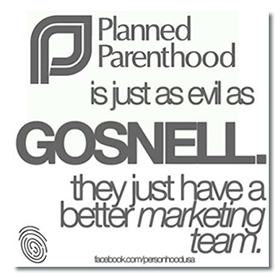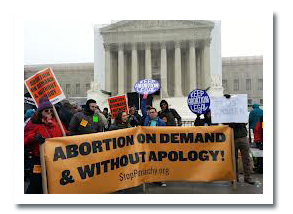[vc_row][vc_column][vc_column_text]Russian communist dictator Vladimir Lenin once said, “A lie told often enough becomes the truth.” I disagree. A lie is a lie no matter how many times it’s repeated.
During the late ‘80s the battle to protect preborn life took a tragic turn. Pro-abortion activists had millions of dollars at their disposal, so they hired pricey Madison Avenue marketing people who knew language generates emotion. It paints pictures with words. Marketing gurus excel at this manipulation of words—we call it semantics.
 And no marketing guru would ever say, “We’re in favor of killing babies.”
And no marketing guru would ever say, “We’re in favor of killing babies.”
So they came up with “pro-choice” and “who decides.” Who isn’t in favor of choice? It’s all-American to be free to choose, right? Whether you want fries with that, whether you prefer original or crispy, choice is good. Isn’t it?
They buttressed their slogan with additional dehumanizing semantics. What was growing inside the womb wasn’t a “baby.” It was “tissue,” “product of conception,” at best a “fetus.” Compare your mental image of the word baby to the clinical term fetus.
The pro-abortion camp might have been callous and selfish, but they weren’t stupid. They continued to use the magic of semantics to paint a picture they wanted America to believe.
And they added their guilt-soothing tag line: “safe, legal and rare.”
But as the reality sank in that abortion was neither safe nor rare, the slogans lost their power. Every picture of a real aborted baby hammered at the lie. Pro-life education neutered their high-priced marketing strategy.
So their pitch became “reproductive freedom” and “reproductive justice,” as if pro-life leaders were taking away women’s right and freedom to reproduce.
 Now the language is changing again, and fans of abortion aren’t even pretending to hide behind semantics. Now they say, like the headline in In These Times, “Abortion Isn’t a Necessary Evil. It’s Great.” Citing a new book by Katha Pollitt, author Sady Doyle argues that abortion is a social good. It prevents suffering, including the “drastic and painful” experience of labor. She added abortion “saves lives, improves lives, and makes for a stronger society.” Doyle concludes, “If Pollitt gets her way, more of us might feel free to admit that, hey: We like abortion.”
Now the language is changing again, and fans of abortion aren’t even pretending to hide behind semantics. Now they say, like the headline in In These Times, “Abortion Isn’t a Necessary Evil. It’s Great.” Citing a new book by Katha Pollitt, author Sady Doyle argues that abortion is a social good. It prevents suffering, including the “drastic and painful” experience of labor. She added abortion “saves lives, improves lives, and makes for a stronger society.” Doyle concludes, “If Pollitt gets her way, more of us might feel free to admit that, hey: We like abortion.”
Last year Mary Elizabeth Williams took to the pages of Salon to decry the “sneaky, dirty tricks of the anti-choice lobby.” She wrote, “Of all the diabolically clever moves the anti-choice lobby has ever pulled, surely one of the greatest has been its consistent co-opting of the word ‘life.’ Life! Who wants to argue with that? Who wants be on the side of … not-life?” (Why didn’t she just come out with it and say “. . . on the side of death?”)
Here’s her bottom line: “All life is not equal. . . . And I would put the life of a mother over the life of a fetus every single time — even if I still need to acknowledge my conviction that the fetus is indeed a life. A life worth sacrificing.”
Finally, the truth. Pro-abortion true believers know they’re talking about ending a life. They just don’t care.
Visit lifeissues.org to learn more about how the words you use can make a difference for life.[/vc_column_text][/vc_column][/vc_row][vc_row][vc_column width=”1/1″][/vc_column][/vc_row]

Leave a Reply